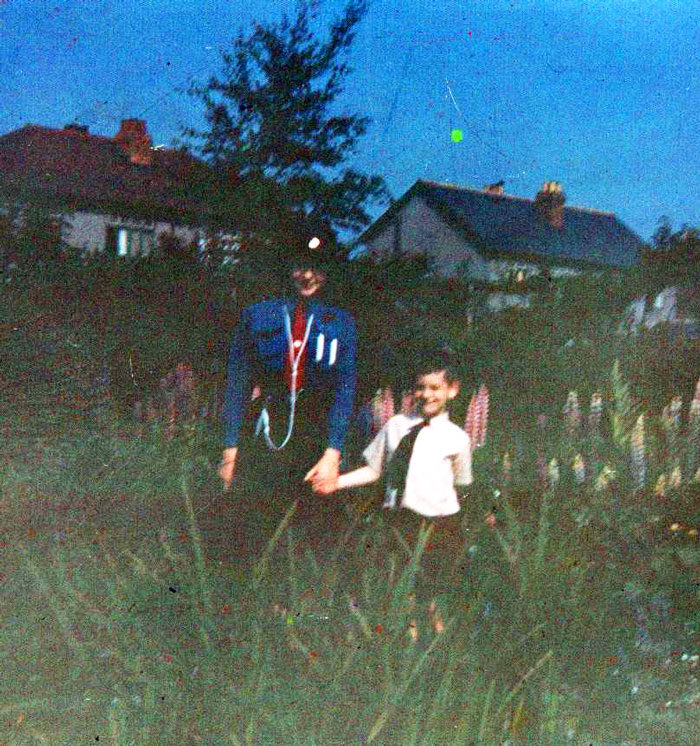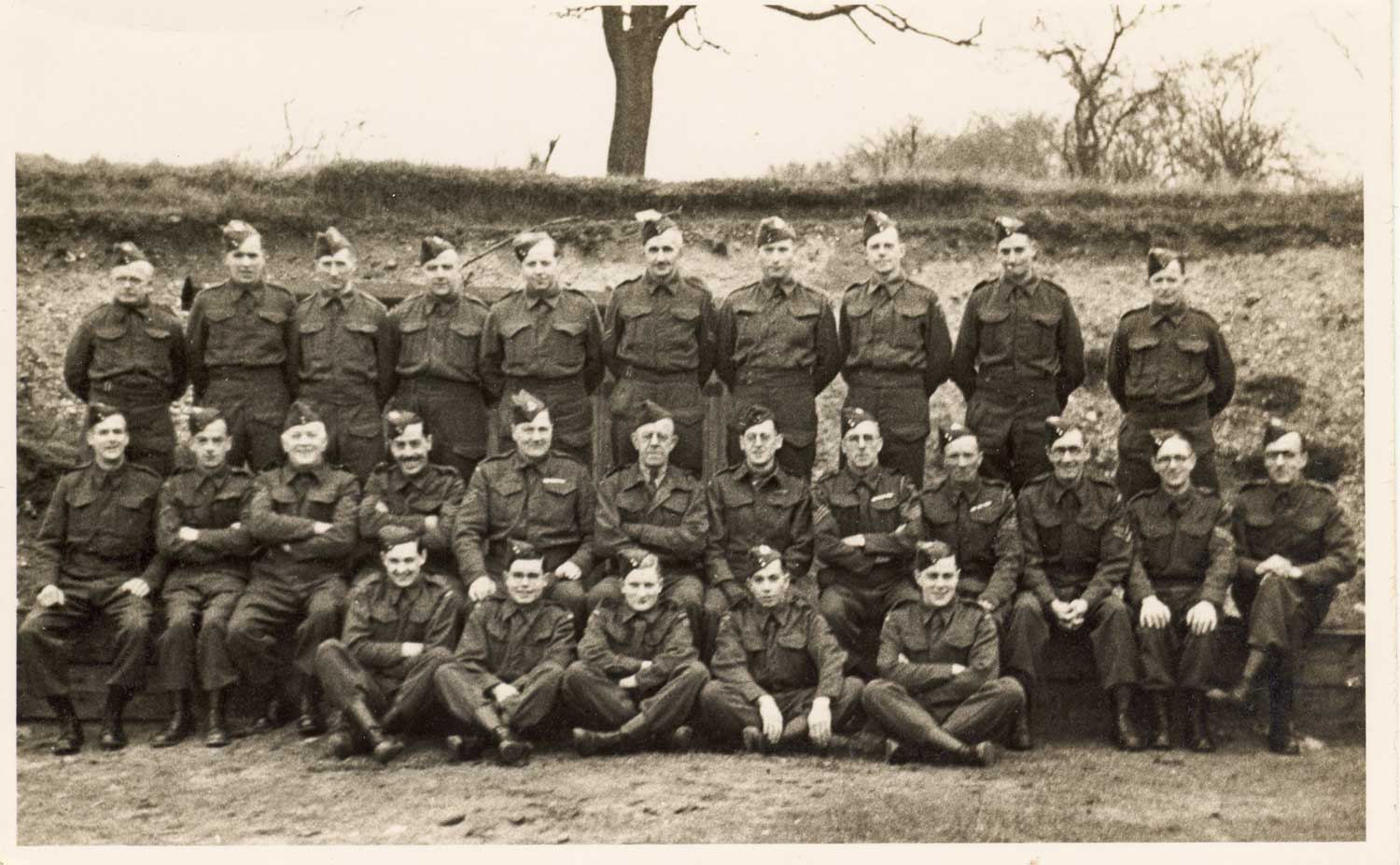MEMORIES
and INFORMATION: 32nd Staffs (Aldridge) Battn. (9)
THE HOME GUARD BONFIRE
STREETLY
This
is a page within the www.staffshomeguard.co.uk website.
To
see full contents, go to SITE
MAP.
|
A memory
from May 1945
THE
HOME GUARD BONFIRE
(Endings and Beginnings)
The fire rapidly caught, the flames licking upwards as they
fed on the liberal splashing of paraffin. Dead branches and
old timber planks began to spit and then crackled and flared
against the darkening sky. I was beside myself with excitement.
Even a small garden bonfire was a wonderful thing; but garden
bonfires were never this huge and they were never lit at dusk,
never, ever. I had the dimmest memory of two other large bonfires
at night, one which seemed to reach to the very heavens and
was accompanied by coloured fire and loud bangs which terrified
me. And another, a gentler affair, when my elder sister, in
her Girl Guide uniform, held my hand and deeply impressed
me by explaining that this huge mound of fire would all have
started from a single match. But this was happening here,
and now, on a cloudless evening in early May, and I was nine
and I was standing in the pasture watching it as the flames
grew and grew.
On the very top of the bonfire there were
two figures, so far untouched by the approaching flames. But
these were no ordinary Guy Fawkes effigies. On the face of
one of them had been drawn a cruel, down-turned mouth and
a pair of round black spectacles behind which two slitted
eyes lurked with oriental menace. But the owner of this threatening,
alien face was only the supporting player in the unfolding
drama. All our attention was on the other figure. It was dressed
in an old Home Guard battle tunic and trousers and under the
peaked cap its pillow case forehead bore an easily recognisable
slick of black hair. A silly little square moustache above
the scowling mouth and a familiar armband removed any possible
doubt about its identity. I watched in fascination as the
flames crept up towards it. A leg was the first to ignite,
followed by the arms and then the whole tunic was burning
and gradually the entire figure started to disappear behind
a wall of flame before sliding slowly down into the very heart
of the inferno. A loud cheer rang out around me. We all knew
that the monster himself had probably been dead now for several
wonderful days. But at that moment I was yet to learn that
he had been disposed of in a similar way: splashed with the
contents of a jerrican and then burnt in a shallow trench -
just as we were now burning his effigy, but more completely
and with far greater ceremony.
Several of my father's old Home Guard comrades
were entertaining the crowd with flares and thunderflashes,
old training stock which had been carefully retained when
the organisation had finally been stood down a few months
previously. For us children there was a table with sausage
rolls and home-made biscuits and something to drink. Lemonade
or ginger beer was dispensed from fat stone bottles into cups.
"Drink from near the handle, dear", my mother would
always whisper to me whenever I was about to imbibe in a public
place. "And avoid any chips". Such advice was difficult
to follow on this particular evening, since most of the cups
were old and cracked and few had retained their handles. But
in any case this was hardly a time for petty rules or worry
about life-threatening germs.
The bonfire was now beginning to subside
and was eventually little more than a large mound of glowing
embers surrounded by an impenetrable wall of heat. I was standing
with my father and one of his friends, Mr. Hall, as close to
the fire as one could comfortably be, and we were all gazing
with fascination into the furnace. At that moment a small
boy of about my age, but unknown to me, tore past us between
us and the fire.
"Hey, laddie" my father's friend
called out in an educated voice. "Where would you be
if you tripped over?"
The boy stopped and turned his face towards
us, his expression containing all the contempt due to someone
who not only has asked a stupid question, but also is an
adult who does not even know how to speak proper.
"In the foire!" he replied, the
intonation one of pure Brummagem; and with a final pitying
look in our direction, he raced off again.
Most of the onlookers were now drifting
away. We waited until the fire had died down further before
finally turning our backs on it. It would gradually cool and
in the morning my father and his friends would return with
barrow and rake and remove the debris, amongst it Adolf's
and Tojo's ashes, and return the pasture to how it was before.
Of course they could not remove the circular, blackened scar
but they would do what they could and then nature would take
over and by the first autumn of peace it would have greened
over as though nothing had ever occurred there. And as the
following years and decades went by fewer and fewer people
would remember the bonfire and the event it commemorated;
or even, as they walked over the car park of the 1950's pub,
the pasture under their feet on which it had taken place.
We were joined by my mother and Mrs. Hall
as we went through the farm gate and turned right to walk
along the Chester Road on which our homes stood a few hundred
yards away. Past Puddepha's, the little shop on the corner
of Bridle Lane where I was regularly sent to buy my father's
two ounces of Gold Flake pipe tobacco or my mother's packet
of Player's. Then over the mouth of Bridle Lane and past a
towering, unkemt, privet hedge on the far corner behind which
crouched a row of old cottages.
The main road was one of the
principal routes out of Birmingham to the north-west, to Holyhead,
Chester and Birkenhead; but as usual at night little was moving
on it. As we walked along we heard the sound of a car in the
distance behind us, coming from the direction of the Hardwick
Arms. As it approached, louder and louder, its headlamps illuminated
the hedges of hawthorn and privet and the front gardens behind
them and cast long shadows in front of us. Finally it roared
past us at speed, as though it were celebrating its liberation
from the black headlamp masks which had until recently allowed
only the faintest of glimmers to light its path. As the single
tail light faded, the only reminder of the vehicle's existence
was a strange, lingering singing of the tyres as they bore
it on its way towards the Parson and Clerk and the Birmingham
city boundary.
Now again there was utter silence, save for
the noise of our footsteps on the gritty pavement. Above our
heads the sky was dark. It had already transformed itself
into that familiar canopy of black velvet extending from horizon
to horizon, studded with pinpoints of flashing diamonds and
the steadier glow of tiny pearls. No street lamp, no unending
stream of traffic yet intruded upon this complete darkness,
nor any longer the distant glow of a burning city. We walked
past the houses of our neighbours, the Caultons, Allums,
Morgans, Lyons, Behagues, Farringtons, Parkers, Darlingtons,
Prices, Milnes, Brains. Past that of our local
ARP warden, Mr. Markwick, who used to erupt from the darkness like a smiling
genie and gently admonish my mother for injudicious use of
her flashlamp. And past houses where a son or a husband was still
far away - Mr. Bacon, Mr. Woodward, Mr. Bullock, my own
brother - and where perhaps there lived a young child who
knew a father only from a photograph and would not recognise
him on his return.
Then we stopped, for here we had to cross
the road to our own house. The grown-ups continued chatting,
obviously reluctant to let the evening end, as I was too.
The suggestion from Mr. Hall of a nightcap resolved the matter
and we continued on our way down the road. Past more houses
with absent fathers, at least one of whom would never return.
Halfway down the hill we turned into our friends' front drive.
Inside the house the grown-ups settled
in their armchairs, the men pouring out a bottle of beer and
the ladies clutching a glass of sherry, carefully husbanded
for just such an occasion as this. A large wireless set, for
once silent, stood in the corner. I lay on the hearthrug and
half listened to the conversation, not consciously telling
myself, as I sometimes did, that I must always remember this
moment although for some reason I always would. Nor did I
ponder on the fact, of which I was well aware, that all the
world's horrors had not suddenly become a thing of the past
but were still alive and well, thousands of miles away. As
warmth and exhaustion started to overtake me, my mind slowly
emptied itself. Tomorrow I would probably think of the delights
to which I could look forward: a planned summer holiday and
the sight of the sea again, now only dimly remembered after
so long; and above all, some time in the now foreseeable future,
the return from Italy of my elder brother whom I had not seen
for over two years and was now having difficulty in visualising.
But tomorrow was tomorrow and today was still today and it
was very late. My parents and their friends gaily chatted
away, their spirits uplifted by the thought that they too
might again be permitted their own pleasures and the fulfilment of some of
their hopes, after years of unrelenting worry and toil. I lay there on the soft hearthrug, still cocooned,
still protected, still safe. A delicious drowsiness enveloped
me. Then, as the voices faded gradually, imperceptibly,
into the distance, I drifted off into a deep and dreamless sleep.
CM.........22nd March 2006
© staffshomeguard.co.uk 2006-2022
*************
FOOTNOTE
July 1942 - three years before the VE Day bonfire and perhaps
three years after my sister's Girl Guides bonfire (see first
para above) - but same sister, same Girl Guides uniform,
same hand-holding and same me!

And some of these men would, two years after
this 1943 picture below, organise and attend the VE-Day
bonfire and share the joy which it gave one nine-year-old boy
- and so many others - on that happiest of days.

For names and other
information, please go to
this page of the website.
|